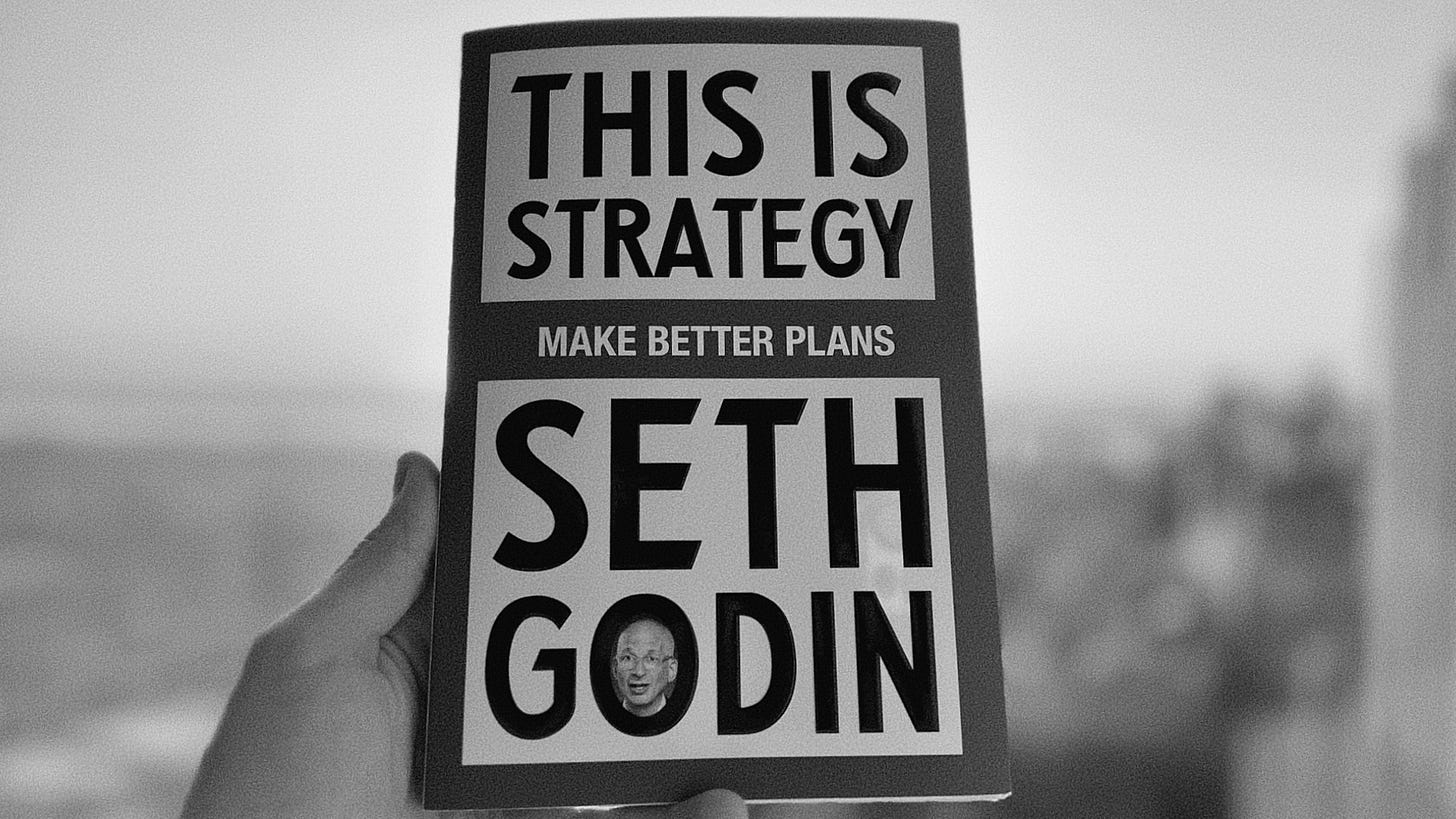Interview with Seth Godin: On Strategy, Stories & How to Hack Back
Seth Godin is an author, speaker, entrepreneur and teacher. With 22x bestselling books (translated into +30 languages), 5x TED talks, name in the Marketing Hall of Fame, +250 episode of his top 1% podcast, Akimbo, and a daily blog with now +9K entries, Seth Godin has been named “The Ultimate Entrepreneur for the Information Age” by Business Week.
His book, This is Marketing, was an instant bestseller and — according to me — the single greatest book on the profession that’s been published.
Seth is a career-defining personal influence on my outlook on both business and the world, and it’s an honor to help promote his latest book, This is Strategy published by Authors Equity — on sale now.
My favorite “Godin-ism” over the years include:
Marketing is the work of helping people get what they’ve wanted all along.
Culture is: “People like us do things like this.”
If you don’t have a book that can galvanize a tribe, if you don’t have a product that will spread, if you don’t have a service that will generate passion among a group of people, you must stop what you’re doing and start over.
We can’t sell less, but we can sell better.
People don’t buy a drill. They buy the hole in the wall. Or better, they buy the shelf on the wall and the cleanliness the shelf provides.
Let’s get to it...
01. On Systems
“Strategy builds systems, but it depends on them as well. Every successful system serves a purpose. It might not be the purpose it says it serves, and it might not seem to make sense, but if the system sticks around, that’s because the system is delivering on a promise. It’s difficult to strategize and make a difference if you don’t understand the systems that are working to keep things as they are.”
MK: In This is Strategy, you ground us in thinking a lot about systems.
What do you see strategic minds getting the most wrong about systems-thinking?
SG: Systems are good at hiding.
They simply feel ‘normal’ but they’re actually defenders of the status quo and the creators of culture.
“What are things like around here” is a way to begin to decode the systems that are driving our perceptions and decisions.
Once you see the system, you can find two things:
Where are the change agents that are forcing this system to adapt or beginning to cause it to fail?
How can I show up to create the conditions for the nodes (people) in the system to get what they want in new and useful ways?
If you can’t do that, you’ll need to simply feed the system and give it what it wants.
Alas, if that’s not what you want, you might need a better plan.
02. On Shipping
“Perfectionism is a false hope and a place to hide. Effort, on the other hand, is our best chance to do work that matters.”
“Until your work interacts with the market, it’s as if there is no work.”
MK: I’m in awe of your output. You’re a renowned “shipper,” modeling these beliefs with a blog post a day, a steady stream of podcasts (and appearances) and 20+ books.
What’s been most helpful in getting over — and continuing to battle — the “it’s not ready” voice?
SG: Leadership is never ready.
Innovation is never ready.
That’s because ‘ready’ means we’re sure that it’s done, that it’s going to work. You can’t run a marathon without getting tired, because tired is the point. Successful marathon runners don’t make the tired go away, instead, they figure out where to put the tired.
Our opportunity as shippers is to figure out where to put the “it’s not ready.'“
MK: I sense for a lot of people — myself included — that the struggle of shipping, let alone shipping rapidly, is the fear: the quicker and more frequent one ships, the lower perceived value the output is, or how “annoying” one can become. What’s your take on this?
SG: Don’t ship junk!
Don’t ship volume simply because you’re fast.
We’re here to create value.
If you are able to offer value and you hold back, you’re stealing.
The generous work is to offer something people need.
If you do that, people aren’t going to mind. Promise.
03. On Stories
“Try to sell a $5 bill at a bus stop for $1. Odds are they’ll ignore you or walk away. It feels like a scam. The ‘no’ you get isn’t someone rejecting you... it’s someone examining the story and comparing it to their worldview. People buy (or reject) stories, not you.”
MK: I don’t know anyone who uses stories as naturally and effectively as you do. You’re an encyclopedia of stories.
I often find that what's harder than distilling a thesis or strategy is actually finding the right illustrative story to bring it all to life.
Do you have a strategy or dirty secret for sourcing, selecting and mapping such spot-on stories to the points you’re making?
SG: The secret to finding good stories is to tell stories.
Teachers who iterate on their craft are paying attention to which stories resonate, improving them as they go.
You’re not going to find a perfect story and tell it.
You’re more likely to tell a story and perfect it.
“Great stories are: true (consistent and authentic), make a promise, trusted, subtle, fast, don’t appeal to logic (but appeal to senses), rarely aimed at everyone, don’t contradict themselves, and most of all agree with our world view, making us feel right all along.”
MK: There’s an interesting tension here between: fighting the status quo vs. making people feel “right all along.” How do you think about having both be true in order to affect change?
SG: The status quo is our current best method for getting what we want.
To tell a story that causes change, the most direct thing is to help people get what they’ve always wanted, but in a slightly different way.
They didn’t sell email by denigrating mail. They sold it by helping people embrace the magic of a letter, but getting that magic faster and cheaper.
It doesn’t have to be tech... The shift in gay marriage happened partly because the movement helped kind and well-meaning people believe that the best way to embrace their traditional values of kindness and family was to embrace those ideas by supporting something that would help their friends and neighbors.
04. On Brands & Marketing
“If Nike opened a hotel, I think we'd be able to guess pretty accurately what it would be like. If Hyatt came out with sneakers, we'd have no clue. Because Hyatt doesn't have a brand. They have a logo."
MK: A lot of people work with and for the “Hyatts” or “Marriotts.”
What’s a “Hyatt” to do? People can argue, Hyatt is doing fine as a business, do they really need their metaphorical sneaker differentiation?
SG: There’s nothing wrong with being Hyatt if you’re getting what you seek. And there’s no need to spend a lot of time and money in “rebranding” meetings, because you’re actually just playing with a logo.
Hyatt succeeds when they win the race to be the convenient, normal and efficient hotel choice for the mass market business traveler. They can focus on that, and not imagine that they stand for much more than that.
My story about logos and brands is designed to help people see that just because one organization has deep roots with an emotional brand doesn’t mean that they’re lucky to accomplish the same.
You can have a logo and not much of a brand. If that’s working for you, I’m not going to talk you out of it.
But!
If you can do the hard, persistent work of building an actual brand, it often pays off. Just don’t confuse it with your logo.
“The best marketers are farmers, not hunters. Plant, tend, plow, fertilize, weed, repeat. Let someone else race around after shiny objects.”
MK: I think because “hunting” for the shiny is both louder and easier to spot, when many in the profession look around, they’re led to believe that’s what we’re all meant to be doing. And further, in a world that’s spinning dizzying fast, patience for that “tending” is getting harder and harder...
I hear a lot of people in marketing and comms work struggle with the cognitive dissonance of: hating what marketing stands for today, yet loving the privilege of getting paid to think about what we think about.
So many feel compelled to “justify” working in this space.
What are your thoughts on this shame?
SG: Old marketing was mostly advertising. When that fell apart, some people replaced it with hype, hustle and spectacle. They replaced with persistently tricking, trapping and annoying people. Feeling shame is appropriate!
Others, though, saw marketing as the chance to be of service. To tell true stories that spread. And most of all, to bring empathy to those we are here to help, and to open doors so people can get to where they hope to go.
Folks who do that rarely feel shame.
05. On Hacking
“You've been hacked. People in power have taken advantage of glitches in our personalities and errors in our instincts to create an environment where they profit and we come out behind. Politicians count on our short attention span. Banks know that we're impulsive. Bosses exert power over us based on our fear of failing. They all fuel a culture that keeps us in hock.
Hack back.
Many powerful organizations fear a truth-teller. They work hard to avoid being confronted by an individual who sees the world as it is and by a person who cares enough to change things. Most of all, they have no plan for dealing with someone motivated enough to walk up the broken escalator. Go.”
MK: What's your take on our state of “hacking back?”
Are we hacking back enough?
SG: Not even close.
Not as long as there’s climate change, systems of misogyny and racism and the corporate greed that leads to a race to the bottom. Not when being a billionaire automatically gives you some sort of cultural status. The systems are real, but they’re not permanent.
MK: To borrow some of Rushkoff’s language, how may we engender environments where we see more “hacking back?”
What’s most missing and required to facilitate more hacking back?
SG: Find the others. Just a few. Then a few more. Talk. Make small changes. Report your victories, brag about your failures. Repeat.
MK: Your “go make a ruckus” call to action is what we need to hear more of. However, deviating from the status quo, asking the hard questions, and zagging are quite scary for those of us who may still want to make a ruckus.
What are the most common excuse you’ve heard to not make a ruckus... and why are they BS?
SG: It’s not BS, it’s real.
The excuses are based on the indoctrination. On years of schooling where not once did they ask you a question they didn’t know the answer to. On a system that rewards compliance.
We have embraced a myth that leaders are special, particularly brave or gifted. But mostly, leaders are amplified by their peers, part of a culture where leading is expected, rewarded and supported.
Go find that circle.
You might not have been trained to boldly lead every day, but each of us is capable of finding and connecting a small cadre, and persistently and consistently learning to lead — by showing up.








